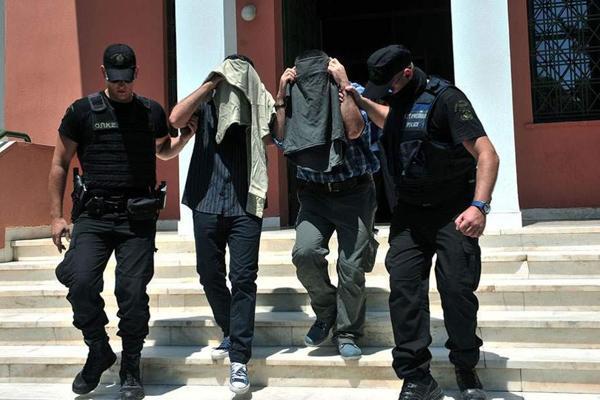Greece on Turkey asylum row: Democracies cannot threaten or be threatened
ATHENS/ ISTANBUL


Greece dismissed Turkish anger on Dec. 31 over its decision to grant asylum to a soldier who Ankara accuses of involvement in the abortive coup against President Tayyip Erdoğan in July 2016.
Turkey said on Dec. 30 the decision by a Greek asylum board undermined relations between the two countries. “Our faith in democratic principles and practices is not a weakness, but a source of strength,” the Greek Foreign Ministry said in a statement on Dec. 31.
“Democracies do not threaten, or can be threatened. On the contrary, they work responsibly and methodically to promote understanding and entrench stability and good neighborly relations. Greece will continue on this path ... and hopes its neighbors will do the same,” it added.
The Greek government had said on Dec. 30 it will seek to invalidate a decision by the country’s Asylum Appeals Authority to grant asylum to one of eight Turkish officers who fled to Greece in a military helicopter after a failed coup in Turkey in July 2016.
Süleyman Özkayakçı had been released early on Dec. 30 from a police precinct where all eight have been held pending consideration of their asylum requests.
The Greek prime minister’s office announced later on Dec. 30 that “following [the government’s] established position on the eight Turkish military officers” it had applied for an invalidation of the authority’s decision, which was handed down on Dec. 29.
Greek Prime Minister Alexis Tsipras has said perpetrators of the failed coup are “not welcome” in Greece. He repeated this position earlier this month, when Turkish President Recep Tayyip Erdoğan visited Greece, but added that the government would respect the judicial system’s decision. Turkey has asked for all eight officers to be extradited.
Omiros Zelios, one of the lawyers representing the officers, told The Associated Press that the application will be heard by an Administrative Appeals Court. Any decision by that court can be appealed to the Council of State, Greece’s highest administrative court.
“This procedure [at the Appeals Court] could last one or two years,” said Zelios, adding that it was the first time the government had asked for an annulment.
Zelios also said he expected the other seven officers to be granted asylum “soon.”
The decision of the Appeals Authority, an independent panel made up of two judges and a law professor, was expected as Greece’s Supreme Court had refused, in January 2017, to extradite the officers, arguing they were unlikely to face a fair trial in Turkey.
The Turkish Foreign Ministry on Dec. 30 slammed the decision granting asylum to Özkayakçı, calling the decision a political one rather than a judicial one, a “violation of international legal norms and principles” and another indication of Greece’s reluctance to fight terrorist organizations.
“Greece, who granted asylum to one of the eight coup plotters who participated in the July 15 coup bid, has once again revealed through this decision that it is a country that protects and embraces plotters,” the ministry said in a written statement.
“Greece is not aware that every Fethullahist Terrorist Organization [FETÖ] member they release is a big threat to their country,” Turkish Deputy Prime Minister Hakan Çavuşoğlu said, echoing the government view with a tweet from his official account on the same day.
“The terrorists you release today are like dynamites ready to explode, and you may not have a country to protect when they do,” Çavuşoğlu added.
The co-pilot at the center of the tension landed in the Greek city of Alexandroupoli, not far from the Turkish border, hours after the putsch was defeated on July 15 2016, and had denied being part of the coup attempt.
The decision by Greek asylum authorities is a blow to Ankara, which has repeatedly requested for the co-pilot to be extradited, but the judges ruled that his human rights would be at risk, Agence France-Presse reported on Dec. 30, citing a source.
They took into account reports from human rights groups and the Council of Europe, according to the source, that warned Turkey has regularly committed human rights abuses against coup suspects.
Despite Turkey’s assertions, the judges said there was no evidence to suggest the co-pilot had participated in the failed coup.
A ruling on the seven other military officers will be made in the coming weeks.
The case has caused tension between the two NATO allies. The Turkish Foreign Ministry previously said failure to extradite the group could have an impact on its ties with Athens, including cooperation in the fight against terrorism and other regional issues.
